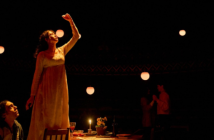Nick Payne’s latest play is a tough watch. It doesn’t deliver a straightforward sucker punch and it’s not laden with histrionics, but sitting through the 70 minutes of Elegy at The Donmar Warehouse is emotionally grueling.
Such is the effect of the increasingly popular topic of dementia for stage and screen. The pain of watching a person’s sense of self unravel seems only rivaled by watching that person’s loved ones gradually lose them, without losing their physical being; watching them forget the memories upon which mutual lives – and loves – are built. And Payne takes this further than a conveyance of familial suffering into the huge and unending questions of what constitutes the self – what makes a person that person at all.

Hats off to Payne for tackling yet another philosophical predicament, much like his smash hit of 2013, Constellations, which used quantum theory to ponder the different paths a budding relationship might take in the infinite scenarios of the corresponding possible worlds. That play is now sweeping Broadway, with constant rumours of a film (though nothing confirmed), and whilst Elegy might not dazzle in quite the same way, it most certainly sets Payne apart as one of our most exciting writers – and one of theatre’s most fastidious thinkers. What’s more, he wheedles his myriad questions into audiences’ heads without seeming to preach at, nor patronize them, nor does his characters appear to be reciting a textbook, which would be all to easy a trap to fall into.
Under Josie Rourke’s classy direction, Zoë Wanamaker plays Lorna, the victim of an unspecified degenerative disease. We meet her post-op, having recently undergone a highly advanced procedure to remove the neurons, or “network of neurons” affected by the illness and insert a prosthetic chip to allow ‘normal’ brain function. The side-effect of this is the total and irreversible deletion of all memories bound up within those affected neurons. In her doctor’s view, this solves the problem entirely: she can now live a healthy life, unhindered by the devastating, not to say debilitating confusion that the illness had been causing. The downside is that the past 25-30 years of her life have been erased.

Our introduction to Lorna comes as she meets Carrie (Barbara Flynn), her wife, whom she only met and married within that last segment of her life. Lorna now views Carrie as a total stranger, eyeing her with guarded suspicion, whilst Carrie still holds all knowledge of their relationship – meeting in their forties as teachers having a go at their church choir, falling in love, organizing their wedding, Lorna’s brutal mental decline – and the reverse chronology takes us through all of that, before ultimately bringing us back round to this awkward meeting with even greater understanding of their grimly frustrating situation.
Wanamaker is devastating, portraying Lorna’s vulnerability and bewilderment with sensitivity, and yet offering wildly raucous glimpses of the vivacious and darkly hilarious woman Lorna once was as we loop back round to happier times. It suits Wanamaker brilliantly, utilizing that coarse voice and wry wit of hers whilst also placing them in bleak contrast to the cold and ghostlike figure she ends up seeming.
Opposite, Flynn arguably has the harder job of conveying Carrie’s despair without self-indulgence and without coming across as whiny or overbearing – simply as a loving wife who is incredulous at the outcome of a supposedly ‘life-saving’ operation, and who must come to terms with the fact that whilst her wife might still be alive, she can no longer truly be called her wife. Indeed, Lorna talks of divorce in a wholly businesslike fashion, which is totally logical for someone who cannot recollect the person standing in front of her, but which anyone watching can feel as the twist of a dagger for Carrie.
The final component of this three-hander is Nina Sosanya as Lorna’s doctor Miriam, who represents the scientific view of all this. Her role is to stand as the icy voice of reason next to Carrie’s inevitably emotional response, and one does view Miriam as almost robotic until we learn of her personal reasons for not wishing to see patients continue in mental decline. When trying to converse with Lorna and Carrie on a personal level, her speech is stilted, full of stops and starts, which is a slightly clumsy trick of Payne’s that is presumably designed to make us feel awkward and nervous around her. When she starts talking about her area of science, and these somewhat hair-raising procedures, she suddenly finds her flow and some animation. Sosanya doesn’t entirely make her mark here, but one suspects that her gawkiness is due to the role itself rather than her interpretation of it.

The set itself also has rather a clunky message, with a giant oak trunk split down the middle taking centre stage, searing up into the ceiling from where fog descends at opportune moments and reaching down the soil that comprises the floor. Mix whatever metaphors you will about earth, faith, life, experience and so forth with that. The clinical chairs feel like they could at any moment represent a hospital waiting room, a church, a museum, a park bench and more – a low maintenance but useful trick by designer Tom Scutt.
But it’s not the set you’re there for: it’s Wanamaker, Flynn, and Payne’s ideas. And none of those things disappoint. This tale eventually reveals a terrible irony that is a genuine gut-wrencher but, to Payne’s credit, its impact is not created by waterworks or melodramatics – it simply turns out to be the pivotal notion pulling all floating questions together. Most definitely worthy of your time and your emotional energy.
Elegy at the Donmar Warehouse until 18th June 2016. Running time approximately 1 hour 15 minutes with no interval. For more information and tickets visit the website.




